How to Listen to Your Gut
- Joan Rothchild Hardin

- Jul 5, 2025
- 9 min read

Do you live mostly up in your head, overthinking and feeling alienated from yourself?
Can you tell the difference between gut feelings and ideas produced by your brain?
Did you know that your gut is constantly talking to your brain and you'd be a lot happier if you'd listen to these messages from your gut?

Overthinking: A mental process in the brain involving excessive analysis and worry, often leading to feeling overwhelmed, confused, anxious, frustrated, tense and stuck

Gut feeling or intuition: A spontaneous, often physical sensation in the body arising quickly, producing a feeling of physical and mental relief and expansiveness
A comparison of intuitions produced by your gut VS ideas produced by your brain

If you continually rely on your head to tell who you are and how to act, think, feel, look and do with your life, this information is for you. Seems to me this style of operating is widespread, which has led to an epidemic of OCD-type thinking: serious overthinking, racing thoughts, difficulty making decisions, anxiety-driven thoughts, insomnia, headaches and feeling stuck.
Much research is being done on the huge topic of the brain's influence on the gut microbiome and vice versa. For the purpose of this article - helping you stop compulsively overthinking - this article focuses on cultivating awareness of the messages your gut is sending to your brain.
THERE'S A BETTER WAY
Don't burden your brain with tasks it can't do and instead partner with your gut to learn how you feel about the thoughts your brain is sending it. The gut is constantly performing this useful function for us but we've mostly stopped listening to its messages, erroneously believing the brain does a better job of guiding us. Not so. We very much need those helpful feelings originating from our guts, which know our true selves much better than our brains do.
If we continually listen only to the loud, wordy ideas generated in our heads, we're unable to hear the quiet bulletins our guts are continually sending out to our brains.
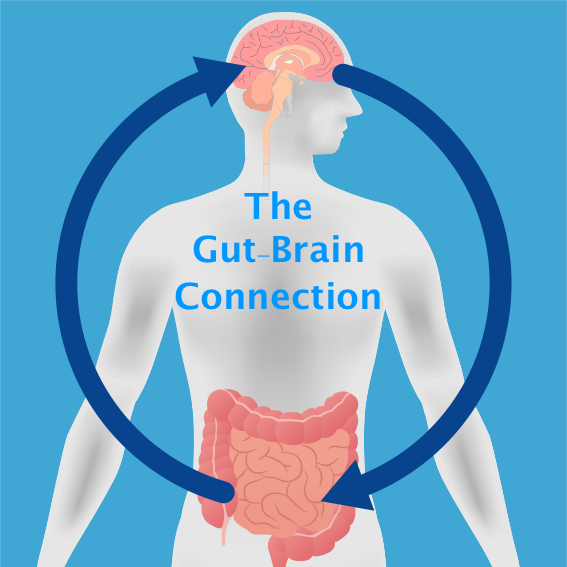
This two-way communication between brain and gut, referred to as the Gut-Brain Axis, takes place via a complex network of nerves, hormones and chemicals and greatly influences our health, mood and over-all well-being. An example you've likely observed is your thoughts influencing your digestion: Your brain is generating scary messages so your digestion is acting scared too.

Ideas cooked up in your brain are sent to your gut, which evaluates them for congruence with your NEEDS, WANTS and VALUES. This two-way communication between gut and brain is continuous. If you're not listening to your gut and only listening to ideas created by your brain, you're likely not making decisions in your best interest.

Intuition: The Power of Unconscious Processing.
"Developing emotional intelligence can significantly enhance our ability to leverage emotions and gut feelings in decision-making. Emotional intelligence encompasses self-awareness, self-regulation, empathy, and social skills. By honing these skills, we become more attuned to our own emotions and better equipped to understand and manage the emotions of others. This heightened emotional awareness enables us to make decisions that align with our values, goals, and overall wellbeing. One effective way to improve emotional intelligence is through mindfulness practices, which help us cultivate present-moment awareness and non-judgmental observation of our emotions." (1)

At this juncture while writing, my own brain jumped to this digression - it's relevant:

French mathematician, scientist and philosopher René Decartes famously came up with Je pense, donc je suis. To help non-French philosophers understand it, he translated it into Latin: Cogito ergo sum, generally translated into English as I think, therefore I am but more accurately meaning I think, therefore I exist.
In either case, the focus on thinking greatly overemphasized the brain. It would have been more useful if he'd stated I think and feel, therefore I am.
Most of us are acutely aware that we are embodied, existing in a living body. I know psychologists aren't supposed to diagnose people we've never worked with but I do have to wonder if Decartes lived so much in his brain that he felt the need to prove he existed.
In his defense, this was in the 1600s, when European Enlightenment philosophers were focused on reasoning, rational thought and the relationship between the mind and body - the so-called mind-body problem.
A reminder that posing the correct question is important. The mind-body isn't a problem, even in the philosophical sense. For thousands of years, indigenous cultures, some non-Western religions and philosophical traditions have grasped that the mind and body are one while our Western approach views the mind and body as separate.
If you detect a straight line from the European Enlightenment to your ignoring your gut intuitions and trying to figure out everything with your brain, you won't be wrong.
By the way, to come up with this proof he existed, Descartes spent time alone inside a heating stove, or maybe a stove-heated room (it's unclear which), to isolate himself from distraction and focus on deep thought and self-reflection.
On November 10 1619, when he came up with Je pense, donc je suis, Descartes was a 23 year old soldier in the Bavarian army, stationed in the German town Neuburg an der Donau. During the cold night inside the warm oven or room, he had dreams he believed suggested a new path for scientific inquiry, applying mathematical methods to philosophy. The idea caught on.

Digression over.
MOVING FROM ANXIETY TO FEELING GROUNDED
This is for those of you who have a lot of sensation in your gut when you feel anxious but don't otherwise know how to listen to the gut's wisdom:
I've observed in myself and in my patients that anxiety is most often triggered by a scary thought that produces worry and fear. A gut feeling generally produces calmness and feeling grounded.
I've also seen in myself and those anxious patients a huge shift from anxiety to feeling strong and grounded after getting the hang of how to use the gut to evaluate ideas sent down from the brain and not rely solely on the brain.
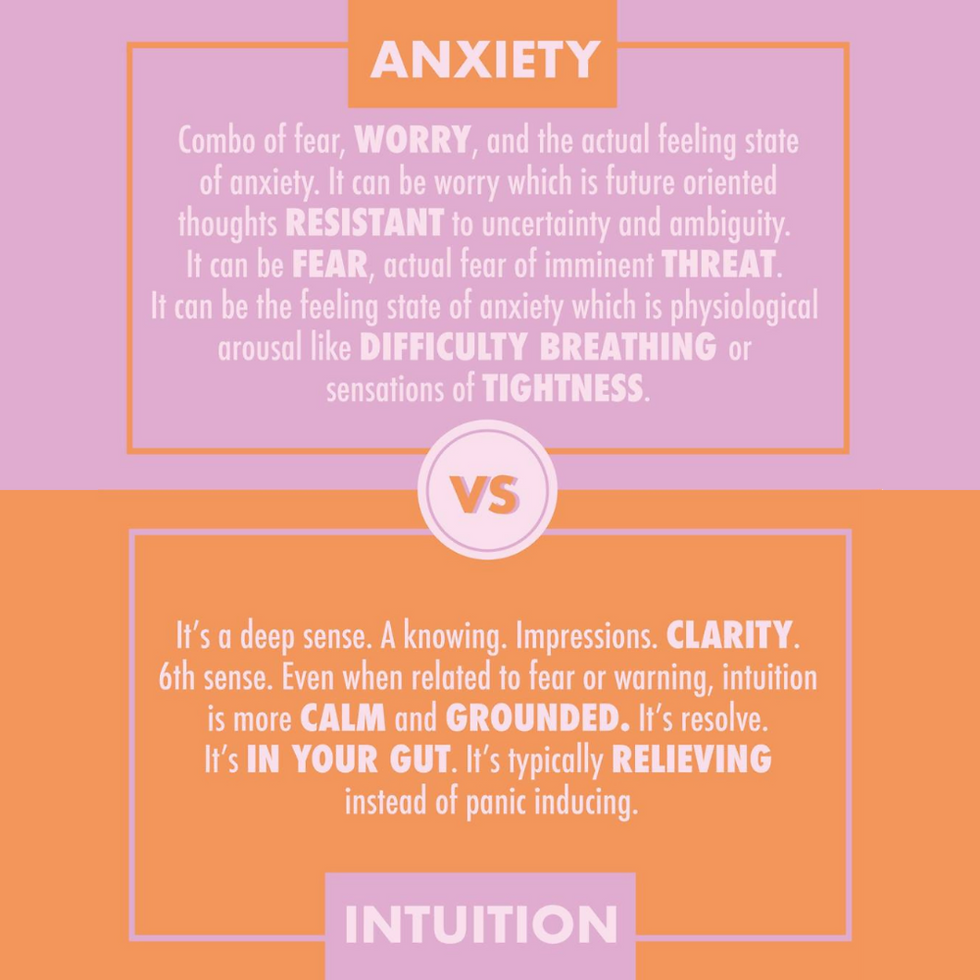
GUT FEELINGS
~ A gut feeling may manifest as a physical sensation, such as butterflies in the stomach, a knot in the stomach, a sinking feeling or a sudden sense of clarity and calm.
~ Gut feelings occur without conscious reasoning, as a gut reaction or intuition.
~ Since the gut and brain are connected via the Gut-Brain Axis, emotional experiences can be felt strongly in the gut.
~ Gut feelings can be used to guide choices and provide insight into whether a thought or decision is correct for you or not, even when conscious reasoning is unclear.
~ When you detect a gut feeling, give it serious consideration. It will be a yes/no reaction to a thought produced by your brain, never a wordy explanation (that's a thought produced by your brain. The gut doesn't produce words, only feelings.
~ Trusting your intuitions helps reduce stress and facilitates confidence in your decision-making.
GUT DYSBIOSIS CAN CREATE DEPRESSION, ANXIETY AND OTHER MENTAL HEALTH PROBLEMS
Dysbiosis, an imbalanced gut microbiome, also greatly affects mood and emotions - as well as a long list of physical symptoms.

See my article Gut Symbiosis versus Gut Dysbiosis for more on an imbalanced gut microbiome.
If you suspect you have gut microbiome issues and want to take a deeper dive into the topic, you could use the search terms Leaky Gut, Microbiome Health, Psychobiotics, Probiotics and Autoimmune Disease to learn more about fixing a dysbiotic gut and autoimmine conditions.
And this is a good article about the range of gut dysbiosis symptoms on Parsley Health's site.

WHY IT'S IMPORTANT TO LISTEN TO YOUR GUT WHEN YOU'RE TRYING TO MAKE A DECISION
Ideas are conscious thoughts, often developed through reasoning and analysis.
Intuition, in contrast, is a feeling or knowing that comes from a deeper, perhaps subconscious, place. It usually arrives as a sudden insight, a gut feeling.
~ Ideas can be articulated in sentences while we often quietly describe a gut feeling as, "It just feels right - or wrong".
~ Gut feelings use our stored library of past experiences to deliver an intuition about a current plan to the brain. These insights may be be hard to explain or justify with logic.
~ Both ideas and intuition are parts of our thought process and both need to be considered to make good decisions.
~ Intuition is a powerful tool for making better decisions, especially when they're about complex situations.
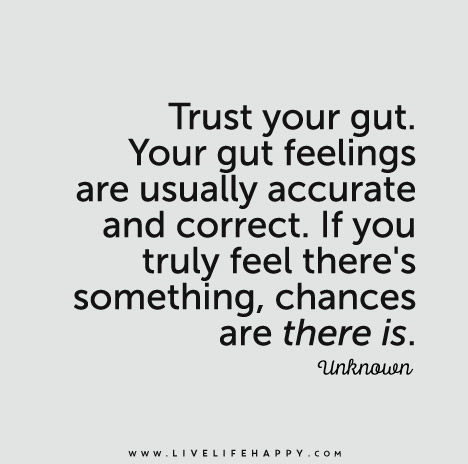
HOW TO PRACTICE LISTENING TO YOUR GUT
~ To get the full benefit from both parts of your thought process you need to become aware of your feelings to identify genuine intuition from other mental processes. This requires practice. I often ask my patients who've just articulated an idea using a lot of words to ask their gut how it feels about that idea.
~ Practicing breath work, mindfulness and body awareness help develop the ability to trust gut feelings.
~ To learn to listen to your gut, cultivate awareness of physical sensations and emotional responses in your body.
~ Use self-reflection to get good at telling the difference between intuitive feelings and anxiety-driven thoughts.
~ Practice noticing when you're overthinking, stuck in thought loops, trying to analyze every detail and possible outcome, creating more questions than answers.
~ Racing thoughts often make you feel stressed and worried. This kind of thinking may give you a headache, create muscle tension, make your rate race or all of the above.
~ Overthinking can stem from unresolved memories from your past when things went seriously wrong or fears about the future.
Cultivating Self-Awareness:
"To tap into our intuition, it is crucial to cultivate self-awareness. This involves paying attention to our thoughts, feelings, and bodily sensations in different situations. By becoming more mindful of ourselves, we can identify patterns and recurring themes that emerge when we listen to our intuition. For instance, noticing a consistent feeling of discomfort before making certain decisions may indicate that our gut is trying to steer us away from potential pitfalls." 1
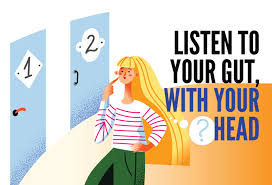
HOW TO DIFFERENTIATE OVERTHINKING FROM USEFUL THINKING
~ Does your body experience an anxious tenseness or a calm knowing after thinking something through?
~ Are your thoughts racing from forcing your brain to do a lot of speedy mental effort or does your brain feel like it's taken a leisurely mental stroll?
~ Have you regretted decisions based on overthinking in the past or have you made good decisions by listening to your gut's opinion on your decisions?

If you're in a hurry or just not interested in anatomy stuff, feel free to skip this next section - but I do need to say that how the brain and gut differentiate during fetal development is quite fascinating and useful to understand.
THE GUT-BRAIN AXIS
In the very early life of a developing fetus, its brain and entire gastrointestinal system develop from the very same piece of tissue, called the neural crest!

Cells from the neural crest migrate up into the head to form the brain and down the developing spine to become the GI tract. This system that develops from the neural crest in humans and other vertebrate animals is the beginning of our Gut-Bain Axis, a bi-directional communication pathway that lets the brain and gut constantly exchange information. And the gut part of the Gut-Brain Axis is so important it's often called our Second Brain.
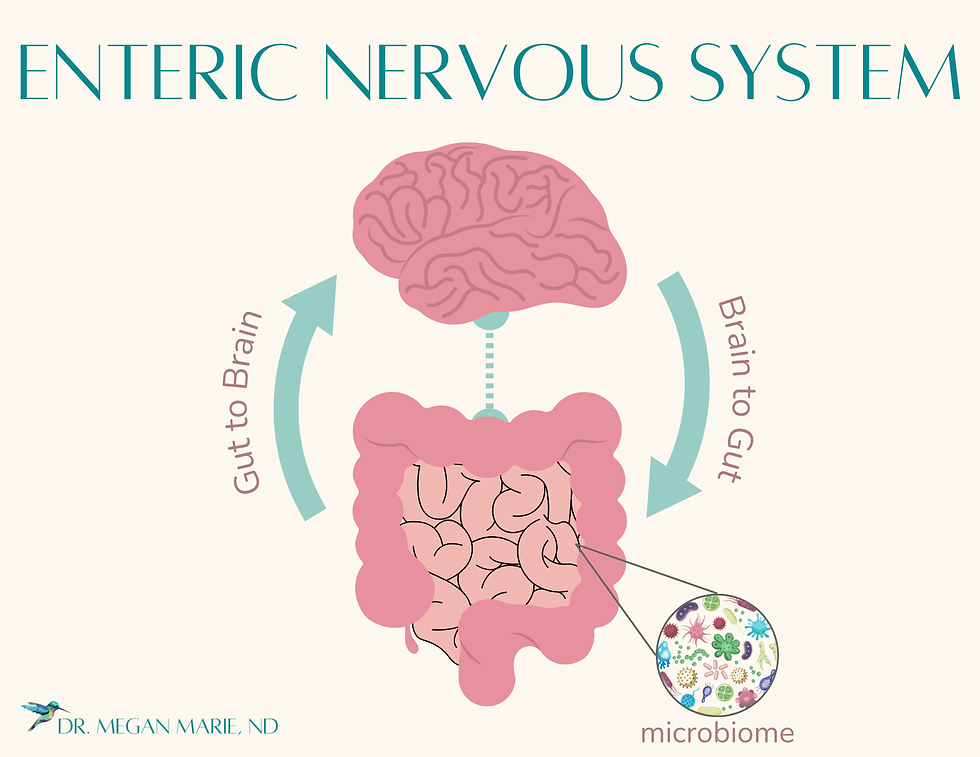
Knowing that your gut and your brain grow from the same piece of tissue, you may not be surprised to learn that both your gut and brain produce many of the same neurotransmitters, including serotonin (the so-called feel good chemical).
Your Gut Really Does Have Feeling
"Gut feelings are totally real. In addition to dopamine and serotonin - 90 percent of which is produced in the gut – the gut releases other major neurotransmitters that are usually associated with the brain, such as glutamate, norepinephrine, nitric oxide and enkephalins, the body’s natural opiates. Research also suggests that irritation in the gut can trigger mood changes and people with bowel disorders, such as Celiac disease and IBS are more likely to suffer from mental health conditions, like depression and anxiety." 2
Our Second Brain refers to the enteric nervous system (ENS), a network of neurons within

the walls of the digestive tract. This vast web of neurons live inside the walls of the GI tract, a tube extending from the esophagus into the stomach, the intestines and the rectum. This web contains over 100 million nerve cells which together are responsible for regulating digestion and also communicating with the brain in our head.
Signals from our central nervous system are needed to keep all the other systems in the body doing what they need to do. The enteric nervous system (ENS) is the only exception to this organization. It alone can function independently of the brain and nerves in the spinal cord.
Perhaps this information helps you realize your brain is just a part of your body's operating system.
Learn to practice this and you'll feel like your true self -

Please rate this post & maybe even leave a comment at the bottom of the page. It would be much appreciated & would help spread the word.
© Copyright 2025 Joan Rothchild Hardin. All Rights Reserved.
DISCLAIMER: Nothing on this site is intended to provide medical advice, diagnosis or treatment.


Thank you for this article! It is so true. I need to listen to my gut more often.
AMM